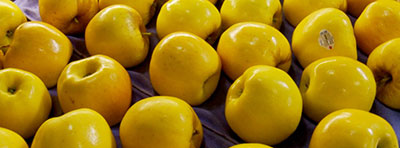The Opal apple: no browning, naturally!
by Trudy Bialic
This article was originally published in November 2014
There’s a new apple with a number of exceptional traits hitting PCC’s produce tables by the end of this month or early December. It’s called the Opal apple and those who have tasted it are big fans.
“It’s crispy like no other”, says food blogger, Lindsey Ostrom. “I need apples to be crispy,” she says, “and the Crunch-O-Meter for the Opal is off the charts! It’s sweet enough for dessert but a teensy, tiny bit tart like an apple should be and golden, bright yellow with a super-soft red blush. The Opal apple also never browns.”
“Cut it up, take a bite, cut a wedge out, and put it in your fridge (or not) for a few days and you’ll still have this pristine white color,” says Lindsey. “This apple seriously does not turn brown.”
The naturally non-browning Opal apple is not genetically engineered (GE) and should not be confused with GE apples that are engineered not to brown. In fact, the Opal is the first apple to be Non-GMO Project Verified.

Non-GMO Project Verified
Since there aren’t any GE apples on the market today, why would anyone seek Non-GMO Project Verification for an apple?
“We want consumers to have confidence that Opal is not a GMO product and not confuse Opal with the new GMO variety currently under consideration by the U.S. Department of Agriculture (USDA),” said Keith Matthews, CEO of First Fruits Marketing. “We felt it was important to clarify the natural non-browning characteristic is just that — natural.”
The Opal apple is grown by Broetje Orchards of Prescott, Washington, one of the largest, privately owned apple orchards in the United States with more than 6,000 acres in apples and cherries. The Broetje team is acutely aware that GE apples that don’t brown are growing in experimental fields about 200 miles away.
GE apples are not approved for market and both the U.S. and Washington Apple commissions are opposed to approval. So you might assume there’s no reason to seek Non-GMO Project Verification. A September article by the Seattle Post-Intelligencer shows how wrong that assumption can be.
Freedom of Information findings
Documents obtained by Hearst Newspapers through a Freedom of Information Act (FOIA) request reportedly show the grower of experimental GE apples in Washington failed to follow even the weak protocols required by USDA.
According to the Seattle Post-Intelligencer, the FOIA documents show Gebbers Farms in Brewster, Washington had gene-altered trees flowering less than 100 feet from traditional apple trees. Gebbers reportedly has been cited before for conducting a field trial too close to conventional apples, as well as for failing to keep good records, and for not making any effort to restrict animals out of the apple fields. Now, USDA has slapped Gebbers with a $19,250 fine for failing to comply with the rules for GE crop trials.
As the Seattle P-I put it, “The prospect of gene-altered apples entering the market is a worry in Washington’s $1.5 billion apple industry, amid fears that consumers will reject tinkering with the genes of a fruit that stands as a symbol of healthy eating.”
The Hearst FOIA also documented that USDA has sent out nearly 200 notices of noncompliance for GE field trial violations nationwide since 2010 – but only two penalties have been issued.
Non-GMO assurance
The new threat of GE apple contamination is not the only reason for value in a verified non-GMO apple label.
Another reason for labeling is that the vast majority of shoppers do not know what foods are genetically engineered. Many otherwise well-informed people are wrong about what they believe is or isn’t GE.
In the apple category, Non-GMO Project Verification no longer is dismissed.
